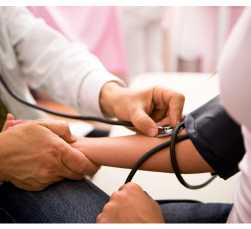Who will be regularly followed in the genetic consultation?
The aim at the family genetic clinic is to assess the real risk of cancer in high-risk families, in order to propose the best preventive measures to avoid the disease.

After this evaluation, only those with high risk of cancer will be regularly followed at the clinic.
High-risk individuals here are those who carry a mutation associated with a syndrome of colorectal cancer (e.g. FAP or HNPCC), or those presenting a worrying family and clinical history but without a genetic test or with an inconclusive one.
High-risk individuals need a closer, more regular specialist follow-up, and identified carriers should also have the option of surgical prophylactic solutions, which drastically cut disease risk.
In less severe cases, a disease surveillance plan is recommended to the individual’s general practitioner (GP), followed by regular visits to the health center.
Even without evidence of high cancer risk, the clinician at the family genetics might decide that you should be under tighter monitoring than what is recommended to the general population. In this case, this recommendation should be passed to your GP.




